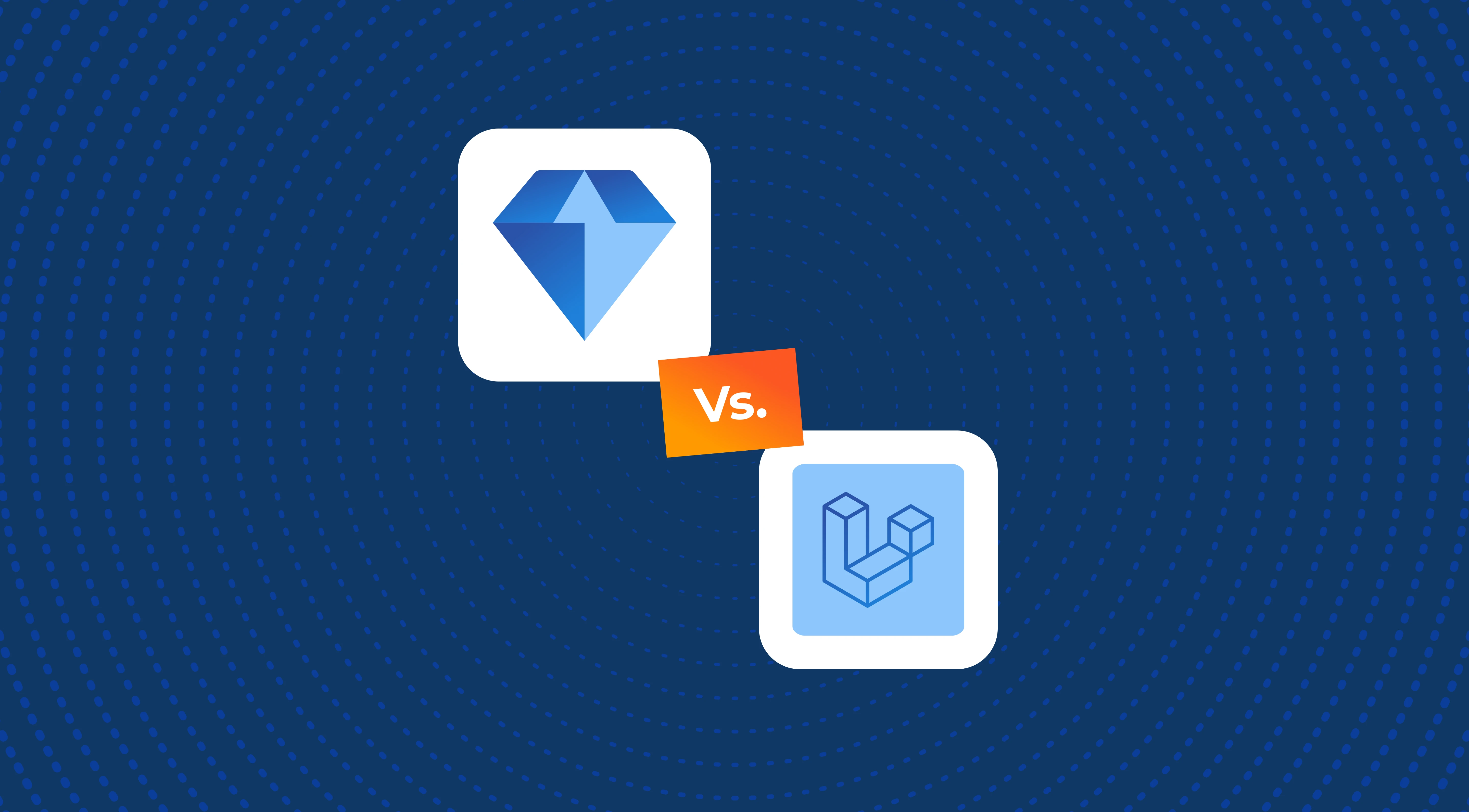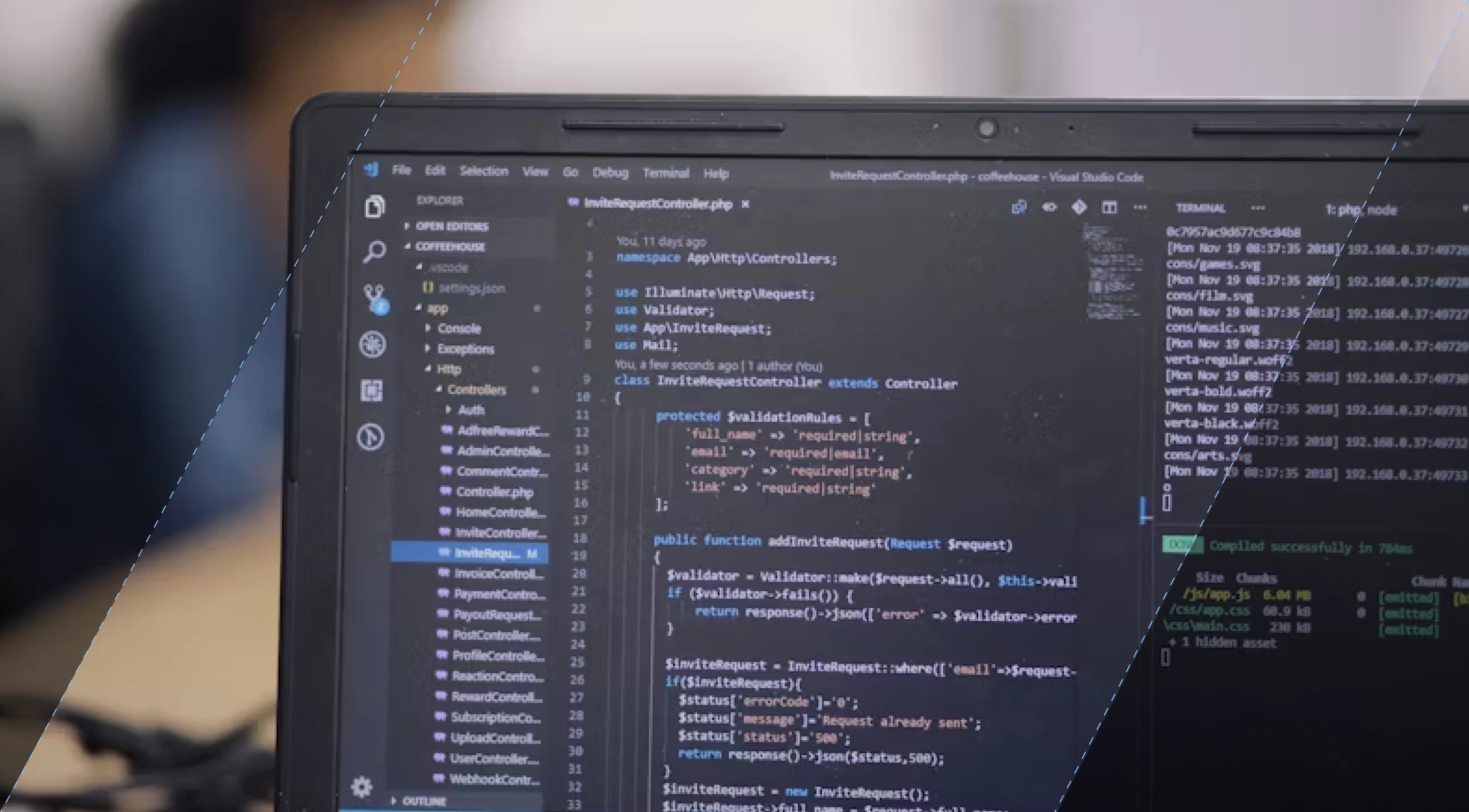SHARE
Ruby on Rails vs. Laravel: Which is Better in 2025?

Contents
Contents
Introduction
Ruby on Rails and Laravel are both open-source frameworks that are used for developing high-quality web applications. They have both been around for over a decade and so have had time to earn equally excellent reputations in the web development community.
But let’s face it, if you’re reading this, it’s because you need to build web applications and you have to choose between both, and you need to pick the framework that is best suited for you.
Because, as we all know, whichever framework you end up choosing for the backend of your project will have a significant impact on the general operation and performance of the app as a business unit.
Well, in this article, we will assess both of them for you; comparing them based on their features, strengths, and weaknesses. Hopefully, at the end of it, you will be better informed to make the best choice for you.

What is Ruby on Rails?
As we mentioned in the introduction, Ruby on Rails is an open-source framework for web development. It was created by David Heinemeier Hansson (fondly referred to in the developer community as DHH), in 2004; and written in Ruby programming language. Ruby on Rails was first developed for Basecamp, a project management tool, owned by a company of the same name.
Ruby on Rails is also well-regarded for its elegant and concise code structure, and also its focus on convention over configuration. It is also known for reducing development time, allowing developers to focus on creating and perfecting the latest features for high-performing web pages and web applications.
Another endearing feature of the Ruby on Rails framework is that it follows the Model-View-Controller (MVC) architectural pattern, which enables developers to separate an application’s data, user interface, web pages, and control logic into distinct components for easier development and maintenance.
The MVC pattern primarily works to structure application programming. Basically, a model in the framework connects to a table in a related database and a Ruby file.
Also, the framework is equipped with a built-in static compilation tool that improves its performance.

What is Laravel?
Laravel is also an open-source web development framework, but based on PHP, rather than on Ruby like Rails is. It was created by Taylor Otwell in 2011 and has since gained significant popularity in the developer community, for its sheer comprehensiveness.
Like Rails, it also uses a Model View Controller pattern, alongside built-in support for authentication, routing, sessions, caching, and other associated tasks.
The framework then goes further to field a powerful object-relational mapper (ORM) system called Eloquent, with which developers can greatly simplify data queries and other interactions with databases.
There are also so many other built-in properties for testing, debugging, and deployment, among many other functions.
Advantages of Ruby on Rails over Laravel
There are several advantages of the Ruby on Rails framework over Laravel. However, the primary advantage that Ruby on Rails offers over Laravel is that it is simply faster and more efficient than many other web frameworks.
This is due to the fact that Ruby on Rails follows the “Convention over Configuration” principle, which allows developers to get more done with less configuration code. This speed is also aided by other built-in features like scaffolding and the Rails console.
We must also mention that the mere fact that Ruby on Rails has been around for almost 20 years means that it has had the time to develop a very mature and stable codebase and developer community and is also constantly being updated and improved.
That’s the kind of security that we’re sure you must be looking for if you intend to build a long-term project.
Advantages of Laravel over Ruby on Rails
Laravel also has its own advantages. First, because the framework is significantly more comprehensive than Rails, it offers well-organized documentation that is easier to navigate, learn, and use.
There is also the fact that it comes with built-in support for many third-party tools, such as payment gateways, cloud storage, and email services.
With these, any developer can easily integrate these functions into their web applications without having to write laborious additional code.
Also, Laravel’s Blade (a templating engine) allows the creation of reusable templates and layouts. This enables developers to maintain and update UI as easily as possible.
Rails vs. Laravel Comparison
There are multiple factors to consider in choosing a suitable web application framework, and they are usually specific to the intended project.
So, it is hardly possible that we can accurately tell you which of both is best for you. However, we can compare them on a few points, to help guide you to a decision.
Programming Language
The Ruby on Rails framework is written in Ruby, while Laravel is written in PHP. It may not seem like much, but you need to examine the suitability of these programming languages for the job that you want to do.
If your team is already well-grounded in PHP, you must consider whether the expected benefits are worth the cost of having them undergo training to get up to speed in using Ruby on Rails.
Learning Curve
Similarly, we should also mention that the Ruby programming language has a steeper learning curve, compared to Laravel, due to its heavy use of conventions and metaprogramming. On the other hand, Laravel’s more straightforward syntax and extensive documentation make it easier to pick up for many developers.
Stability
Stability is another issue to watch out for. It is not totally uncommon for development frameworks to have support for them withdrawn by their creators. And as you would expect, scenarios like that would cause a load of problems for developers who have built apps on those frameworks.
In this case, it is safe to say that both frameworks have achieved a significant level of stability. Ruby on Rails was created almost 20 years ago and has come to be known as the framework on which a good number of popular apps are built. So, the chances of its creators pulling support anytime soon are very slim.
On the other hand, although Laravel is a relatively new language, 12 years is also a long enough time to have attained stability, as a dependable development framework.
Community Support
Both web development frameworks have large and active communities, with an abundance of resources, and packages available to developers. However, following a recent resurgence in the popularity of PHP, the Laravel community has seen a rather rapid resurgence.
However, it is never a question of which is the biggest of the Ruby on Rails community or the Laravel community, but of which active community best provides the answers, resources, and gathering of experienced developers that you need to guide you in your project.
Popularity
Laravel is generally more popular than Ruby and it’s not hard to see why. Laravel is favored for its scalability, built-in authentication capabilities, and performance while Ruby is often cheered for its development speed. It’s no surprise that Laravel powers over a million websites on the internet today.
Summary
Well, now that we have come to the end of this article, what have we learned? Well, we believe that we can all agree that the Ruby on Rails framework is faster and more efficient due to its “convention over Configuration” property
On the other hand, Laravel offers well-organized documentation and built-in support for third-party tools which enable more robust web development and operation.
You need to carefully examine your project to determine what requirements are most important to its success, and compare these two options based on those requirements, using the factors that we have listed in this article as a guide. Both Laravel and Ruby on Rails are suitable for custom web development projects.
Frequently Asked Questions
Now, let’s provide some answers to the most frequently asked questions about Rails and Laravel.
What alternatives are there to Ruby on Rails and Laravel?
There are several other frameworks that may serve as alternatives to the Ruby on Rails framework. Choices include Django, Express.js, Flask, and Phoenix, among many others. For Laravel, alternatives may include Symfony, CodeIgniter, CakePHP, or Zend Framework.
All of these frameworks offer unique features and advantages. As always, your choice should be determined by the specific needs and requirements of your project.
How do you learn Ruby on Rails development?
Like with all other programming languages, you can opt for Ruby online on-demand courses, participate in high-level classes at boot camps, or join developer communities on YouTube and other online platforms, if you are on a limited budget. Ultimately, your choice should be based on your personal preferences.
Work with Ruby on Rails developers.
What is a full-stack framework?
A full-stack framework is a software framework that provides developers with tools and libraries for building web applications that include both frontend and backend components.
With a full-stack framework, developers can build complex web applications with less code and in less time than if they were to build everything from scratch.
Expert Ruby on Rails Development Services
Flatirons is a top-rated Ruby on Rails service provider.
Get the CEO's Take
Handpicked tech insights and trends from our CEO.
Expert Ruby on Rails Development Services
Flatirons is a top-rated Ruby on Rails service provider.
Get the CEO's Take
Handpicked tech insights and trends from our CEO.

Perl vs Python: Choosing the Right Scripting Language
Flatirons
Apr 20, 2025
IoT Database: Manage Connected Device Data Efficiently
Flatirons
Apr 14, 2025
Proof of Concept Template: A Step-by-Step Guide
Flatirons
Mar 26, 2025
Objective C vs Swift: Which is Better for iOS App Development?
Flatirons
Mar 25, 2025
Scala vs Kotlin: Comparing the Functional Programming Giants
Flatirons
Mar 22, 2025
IoT Smart City Solutions: Transforming Urban Living
Flatirons
Mar 17, 2025